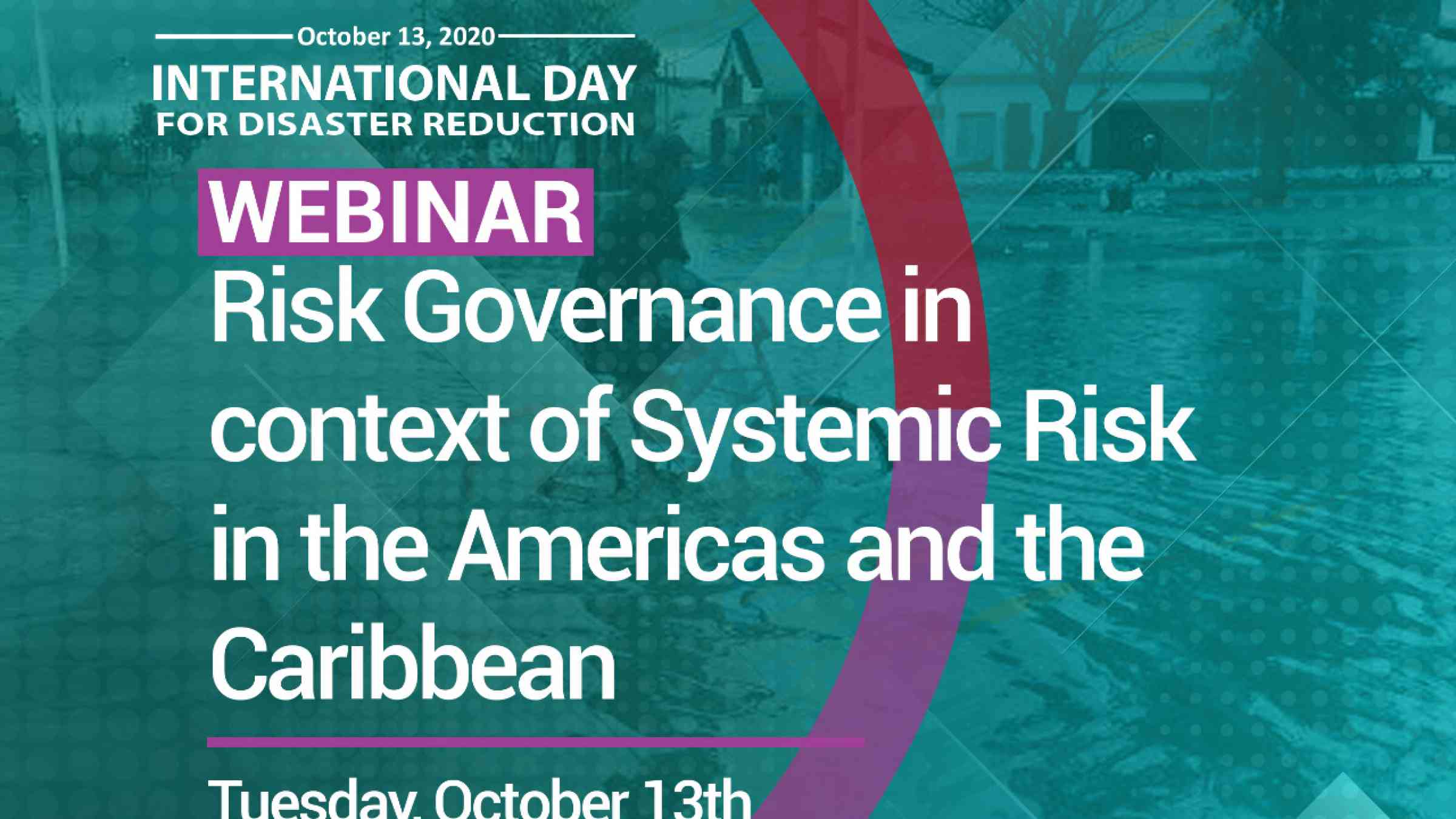UNDRR ROAMC: Risk Governance in context of Systemic Risk in the Americas and the Caribbean - IDDRR

Webinar Risk Governance in context of Systemic Risk in the Americas and the Caribbean - International Day for Disaster Risk Reduction
UNDRR - Regional Office for the Americas and the Caribbean
Date: Tuesday, October 13th. 9:00 a.m. (Panama time).
Registration link: https://undrr.zoom.us/webinar/register/WN_Yds2kF_8QHSAl9kTNm3gfQ
#ItsAllAboutGovernance #DRRday
Background:
The United Nations General Assembly has designated 13 October as International Day for Disaster Risk Reduction to promote a global culture of disaster risk reduction. It is an opportunity to acknowledge the progress being made toward reducing disaster risk and losses in lives, livelihoods, and health in line with the Sendai Framework for Disaster Risk Reduction 2015-2030 adopted at the Third UN World Conference on Disaster Risk Reduction in Japan in March 2015.
In 2016, the UN Secretary-General launched “The Sendai Seven Campaign” to promote each of the seven targets over seven years. The 2020 target is Target E: “Substantially increase the number of countries with national and local disaster risk reduction strategies by 2020” which lays the foundation for the implementation of the Sendai Framework and is closely linked with Priority for Action 2: “Strengthening disaster risk governance to manage disaster risk.” Although not explicit in the target as such, the strategies and plans should search to incorporate and provide for the approaches and focuses signed on to in the SENDAI agreement, including those relating to systemic risk and consideration of new types of disaster hazard in a multi-hazard framework.
In keeping with the Day’s focus on the impact that disasters have on people’s lives and wellbeing, this year’s theme is about conveying the message that many disasters can be avoided or prevented if there are disaster risk reduction strategies in place to manage and reduce existing levels of risk and to avoid the creation of new risk and that these must be fully cognizant and sensitive to the systemic, complex and concatenated nature of much disaster risk today. What that amounts to is “good disaster risk governance” And this will require continuous evolution and improvement in the risk management systems available to different countries.
For more information: https://www.undrr.org/publication/concept-note-international-day-disaster-risk-reduction-2020
Objectives:
- Advance in providing a clear understanding of the systemic nature of risk as seen from the perspective of the science community and the DRM systems and organizations that need to deal with it?
- Share the findings of the Regional Assessment Report (RAR) on the existing status of DRR governance across the region.
- Highlight achievements of one country that has capacity to plan, develop and implement an multisectoral action on disaster risk reduction including for biological risks and hazards, in line with developing ideas on systemic risk and national development planning.
- Bring into the conversation the role of the private sector in DRR governance and DRR strategies.
Key Messages:
- It is all about good disaster risk governance, based on an adequate understanding of disaster risk and its increasingly systemic nature.
- Good governance has clear direct impacts in reducing disaster losses and damage. Multisectoral cooperation is a key element for effective disaster risk governance and real socio-economic development. Multisectorial engagement is a key element for protecting development efforts and ensuring resilience, continuity and efficiency of public administration.
- Countries that develop policy, legislative frameworks, and institutional architecture and associated investment vehicles for disaster risk reduction in line with the goal, targets and priorities for action of the Sendai Framework, have greater capacity to manage disaster risk.
- Plans and strategies must reflect the multidimensional, systemic nature of risk, if people and ecosystems are to be protected and resilient.
- Disaster risk reduction must be included explicitly in national development plans and climate adaptation plans and budgets, across all parts of government to achieve a reduction of disaster risks.
- An all of society approach is key to achieve good governance and DRR. National platforms are a key mechanism to operationalize the all of society approach including the private sector.
Panelists
- Systemic Risk | | Roger Pulwarty | | Senior Scientist | | NOAA | |
- The fundamental role of Governance in DRR | | Sergio Lacambra | | Lead Specialist in Disaster Risk Management IDB ||
- National experience in development Planning to achieve DRR Governance | | Pilar Garrido Gonzalo | | Minister of National Planning and Economic Policy Government of the Republic of Costa Rica | |
- Near to citizens: experience in DRR Governance from Local Authorities | | Andrea De Nigris | | Resilience Executing Unit of Montevideo, Uruguay | |
- Perspectives from the Private Sector on DRR Governance in alliance with the public sector. The COVID –19 experience in the Caribbean | | Dr Lizra Fabien | | Executive Director, Dominica Association of Industry and Commerce (DAIC) Immediate Past Chairperson, Network of Caribbean Chambers of Commerce (CARICHAM) | |